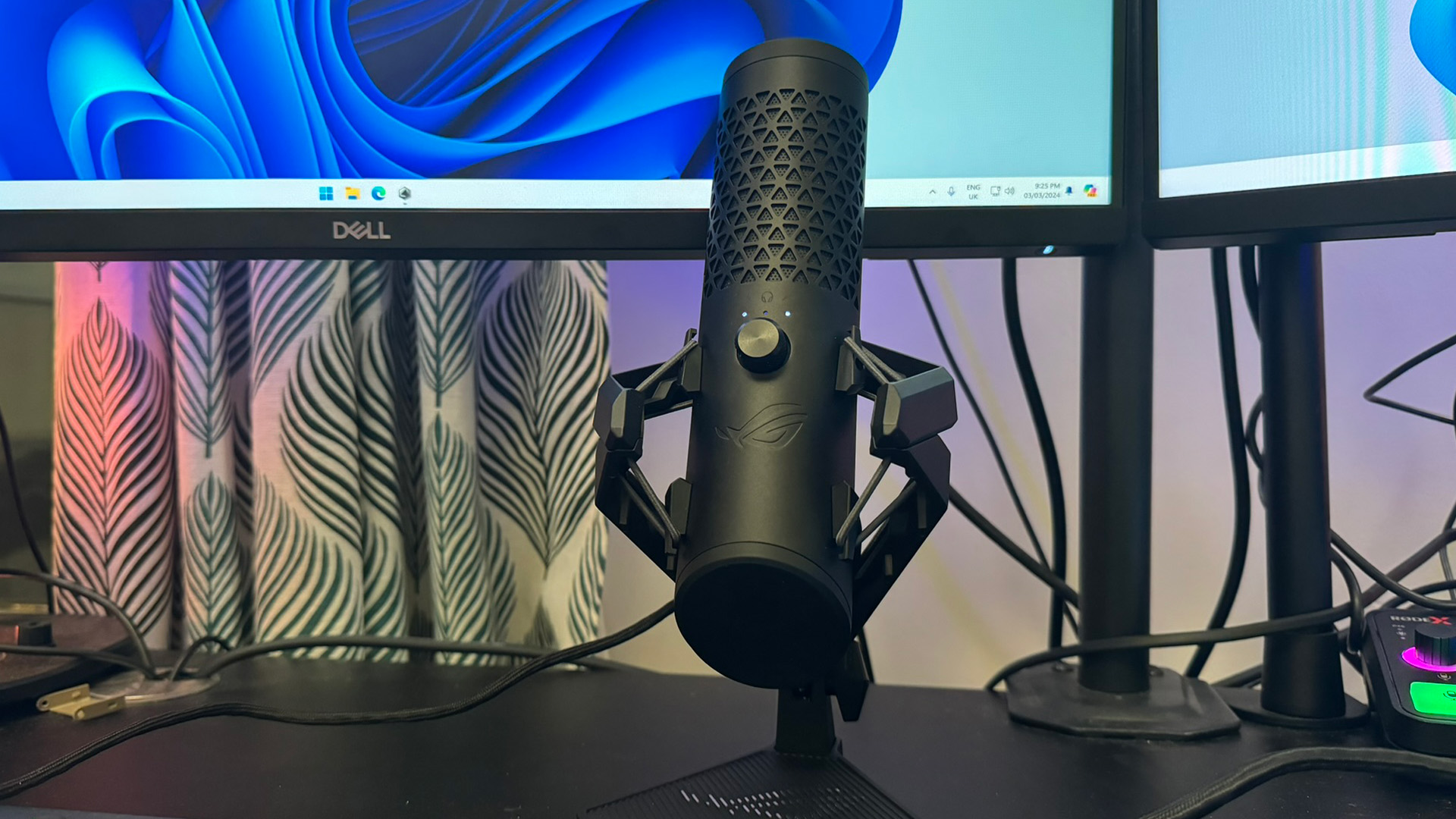
The Asus ROG Carnyx reminded me that it’s easier than ever to stream your gameplay these days. There are more titles to choose from, numerous platforms to stream on, and more hardware to help you broadcast it all. It’s not surprising then that previously uninterested gaming brands are jumping on the bandwagon and adding microphones to their wares.
The ROG wing of Asus already offers just about everything a gamer could hope for so it was only a matter of time before we saw a new top-spec microphone from the brand. The ROG Carnyx is a premium-level microphone aimed at gamers who are looking to take content creation a little more seriously.
A £169.99/$179.99 USB contender, the Carnyx goes head to head with a number of the best microphones for streamers and gaming and enters an already crowded market. So does ROG have what it takes to stand out, or is this microphone just going to get lost in the noise?
Design & Features
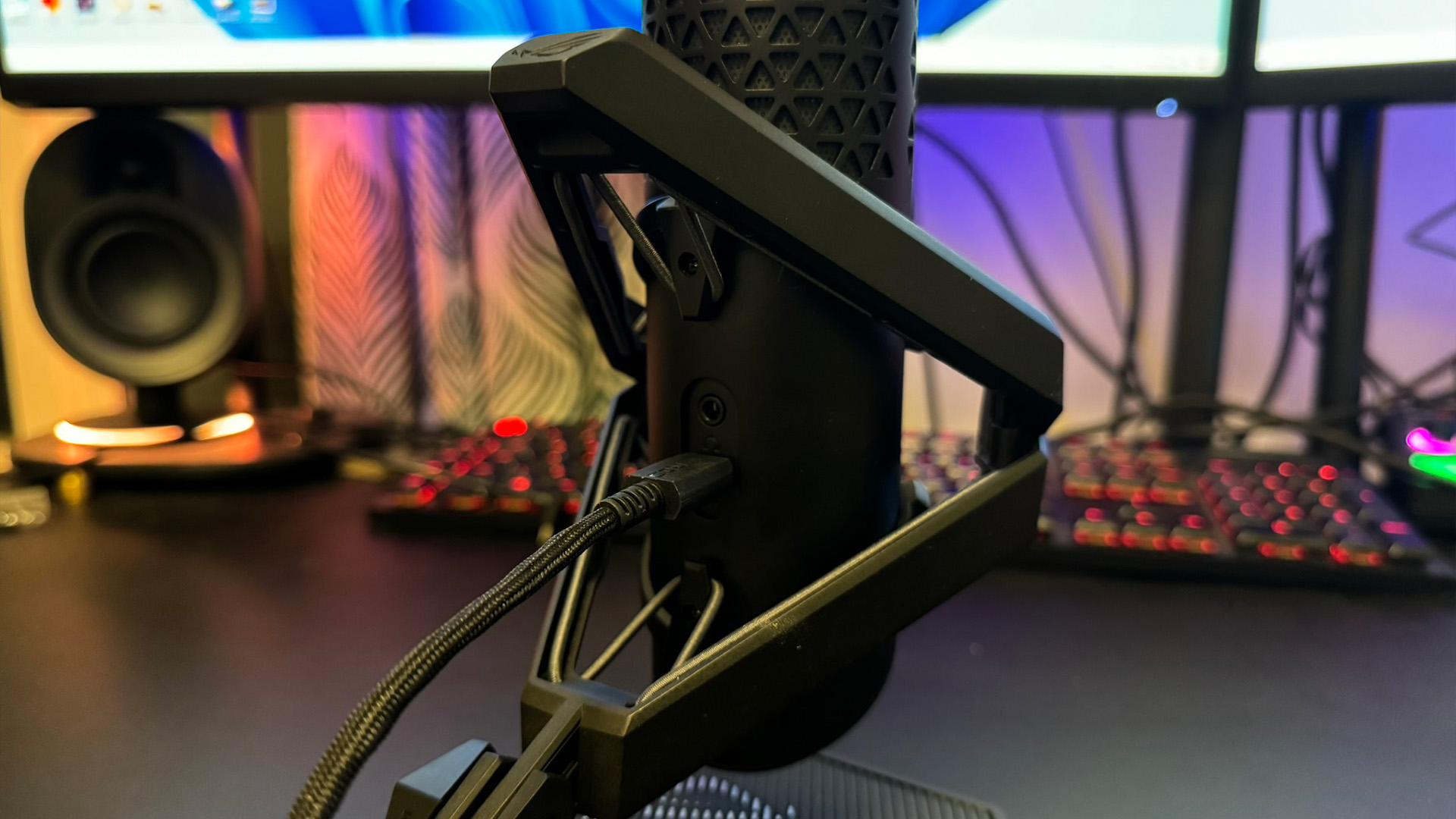
From a design standpoint, the ROG Carnyx is simultaneously outlandish and simple, which is an impressive mix to pull off so effectively. The microphone itself is a pretty basic tube that’s held aloft by a permanent shock mount and stand combo that’s all funky and angular. It’s very "gamer" and very on-brand for ROG with a number of logos and design flourishes in the mix.
Build quality is generally strong with a metal casing on the main microphone body complimenting the all-metal stand and mount, but a pair of plastic ends to the microphone rather spoil it as they feel cheap and out of place. It’s also an unbelievably big unit, far too big in my opinion because sitting 25cm off the desk at its highest point it’s much too large to fit under a monitor without blocking a fair part of it. With one of the best capture cards, a stream controller, probably two monitors, and one of the best webcams already taking up space on a desk, microphones like these don't help themselves by being this large. There’s little adjustment on offer in the stand to help this either, just a little tilt back and forth and no way to rotate it to a horizontal position.
I imagine many will go without the stand altogether and instead bolt the ROG Carnyx directly onto a mic arm. While it should be pretty universally compatible with arms from different brands, you’ll need to dig out a screwdriver to remove the baseplate which is far less user-friendly than it should be. Surely ROG could have found a thumb screw to use instead?
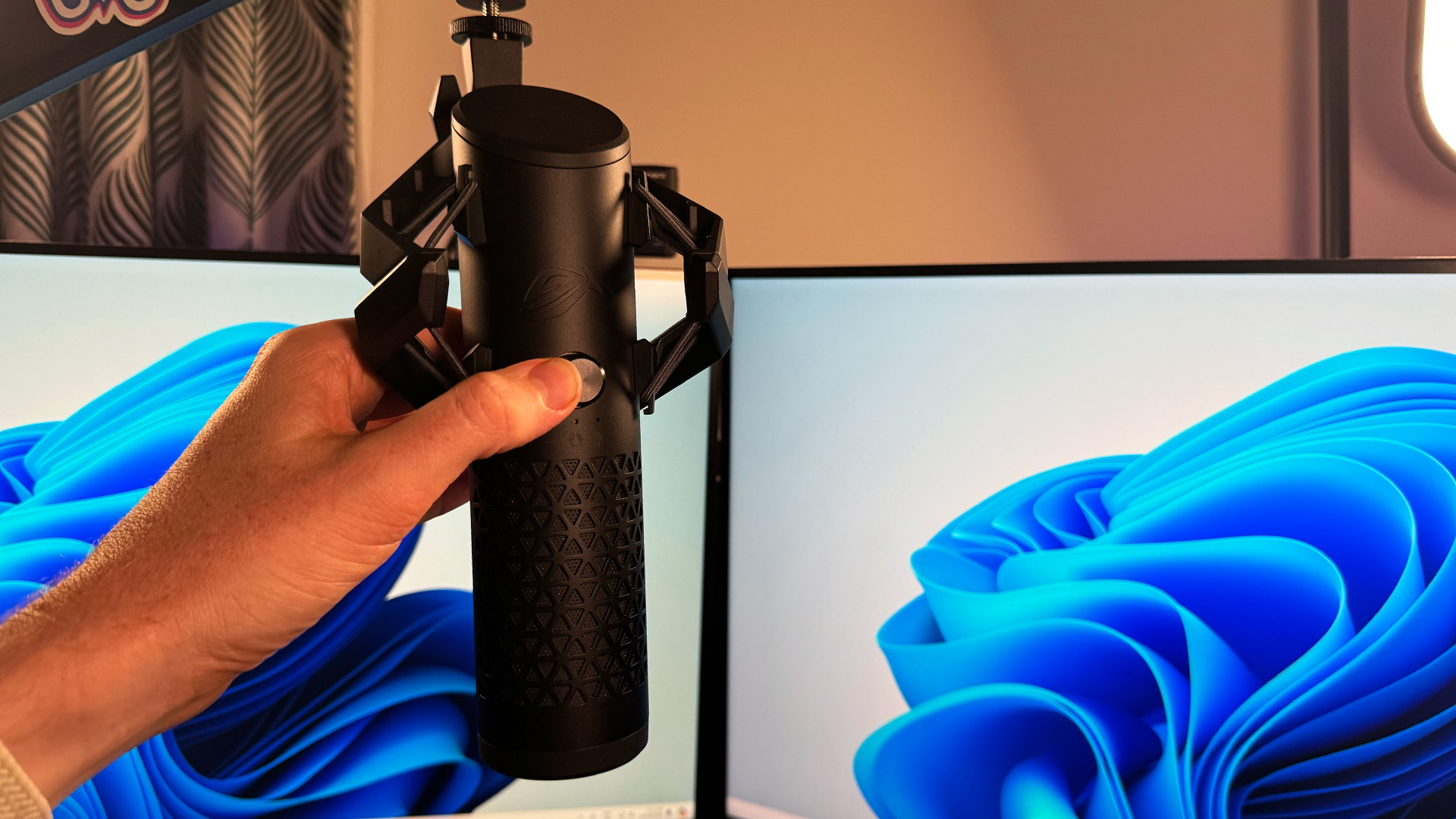
You’ll find the USB-C port and a 3.5mm headphone jack easily accessible on the back of the Carnyx and the multi-function dial on the front is nicely textured. The dial lets you switch between controlling mic gain and headphone output levels, as well as toggling the onboard high pass filter. It’s an intuitive control scheme but the dial needs a surprisingly firm press to activate so be warned that you’ll send your mic flying unless you hold on to the back of it too.
A touch-sensitive mute button sits on top of the ROG Carnyx and while it’s simple enough to fire off you’ll need to pay attention to where you’re tapping because it doesn’t cover the entire surface. The microphone itself may be 55mm across but the working area of the mute button is only the middle 20mm or so with no ring indicator to let you know where the hidden button ends and plain plastic begins. It made for a fiddly experience trying to quickly mute myself while testing. I found I almost always needed multiple taps to get it to trigger.
You’ll definitely know when you’ve found the right spot though because the inside of the ROG Carnyx will ignite in a fiery red glow from within when you're muted. It’s an eye-catching effect that you’ll do well to miss as the LEDs are punchy and offer strong color with even brightness. In theory, you should be able to do a lot more with the LEDs onboard the ROG Carnyx by utilizing the Aura Sync effects inside the Armoury Crate desktop app. I say in theory because after more than an hour of uninstalling, reinstalling, unplugging, and restarting I could never get the app to recognize the Carnyx and ultimately gave up. I’m sure the lights would have been very pretty though.
Performance
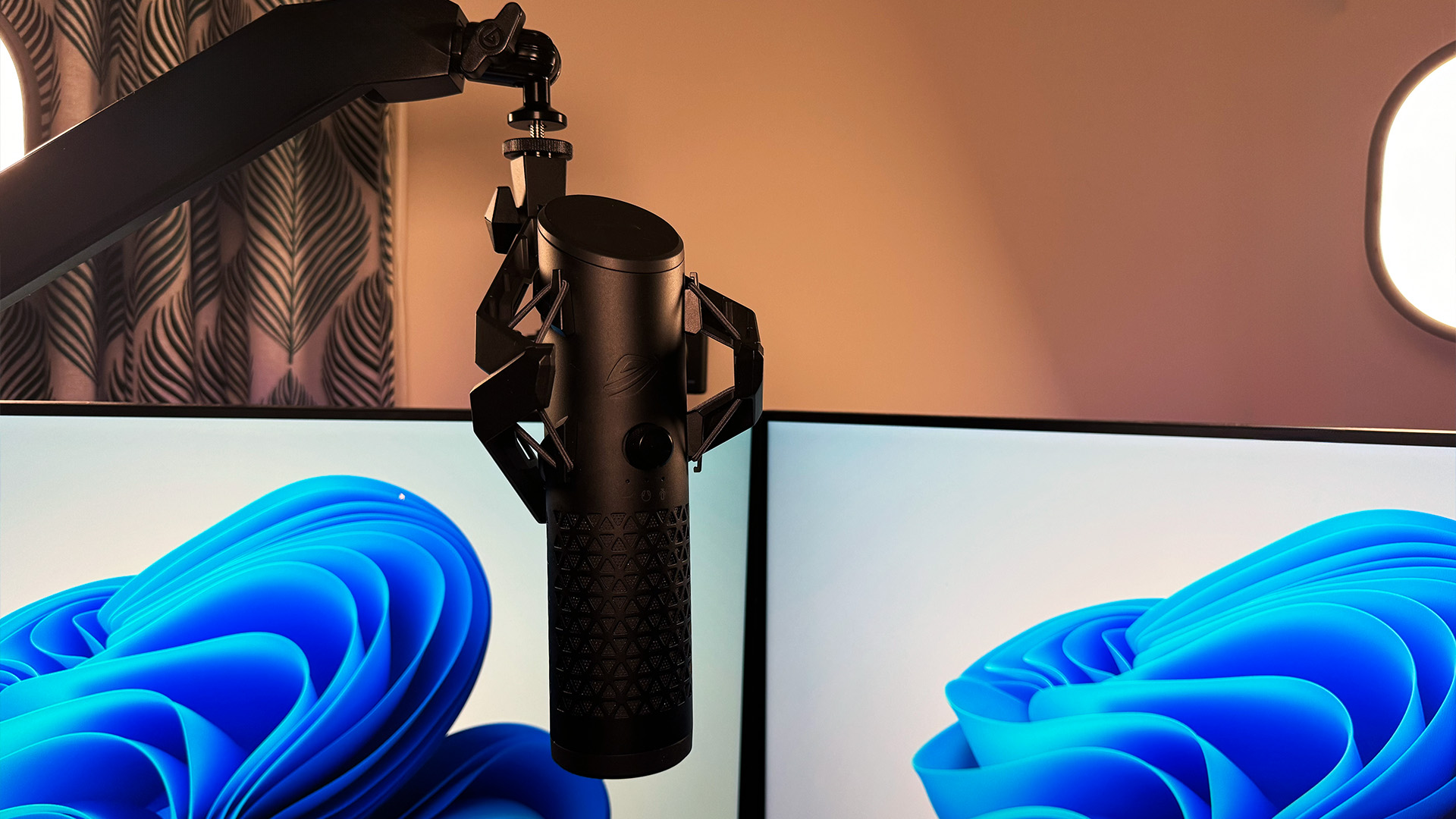
A single USB cable is all you need to get started with the ROG Carnyx and there’s a generously long 3m braided USB-C to USB-A cable included in the box. Both my streaming PC and OBS instantly recognized the mic as soon as I plugged it in, making it even more baffling that ROG’s own software was none the wiser. Luckily, the EQ options on offer inside the app are either available in OBS or using the Carnyx’s onboard controls anyway so I wasn’t missing out on much. Perhaps a few software patches will help things.
Like the SteelSeries Alias and SteelSeries Alias Pro microphones, there’s a professional grade 25mm condenser capsule tucked away inside the ROG Carnyx and throughout my testing, I found it delivered impressive audio. Everything I captured was clean and well-rounded, particularly when I got a little closer to the microphone itself. While this is a condenser microphone so mic etiquette is nowhere near as important and the pickup area is fairly wide, I found the ROG Carnyx offered a far deeper, smoother sound when you addressed it from 10-15cm away.
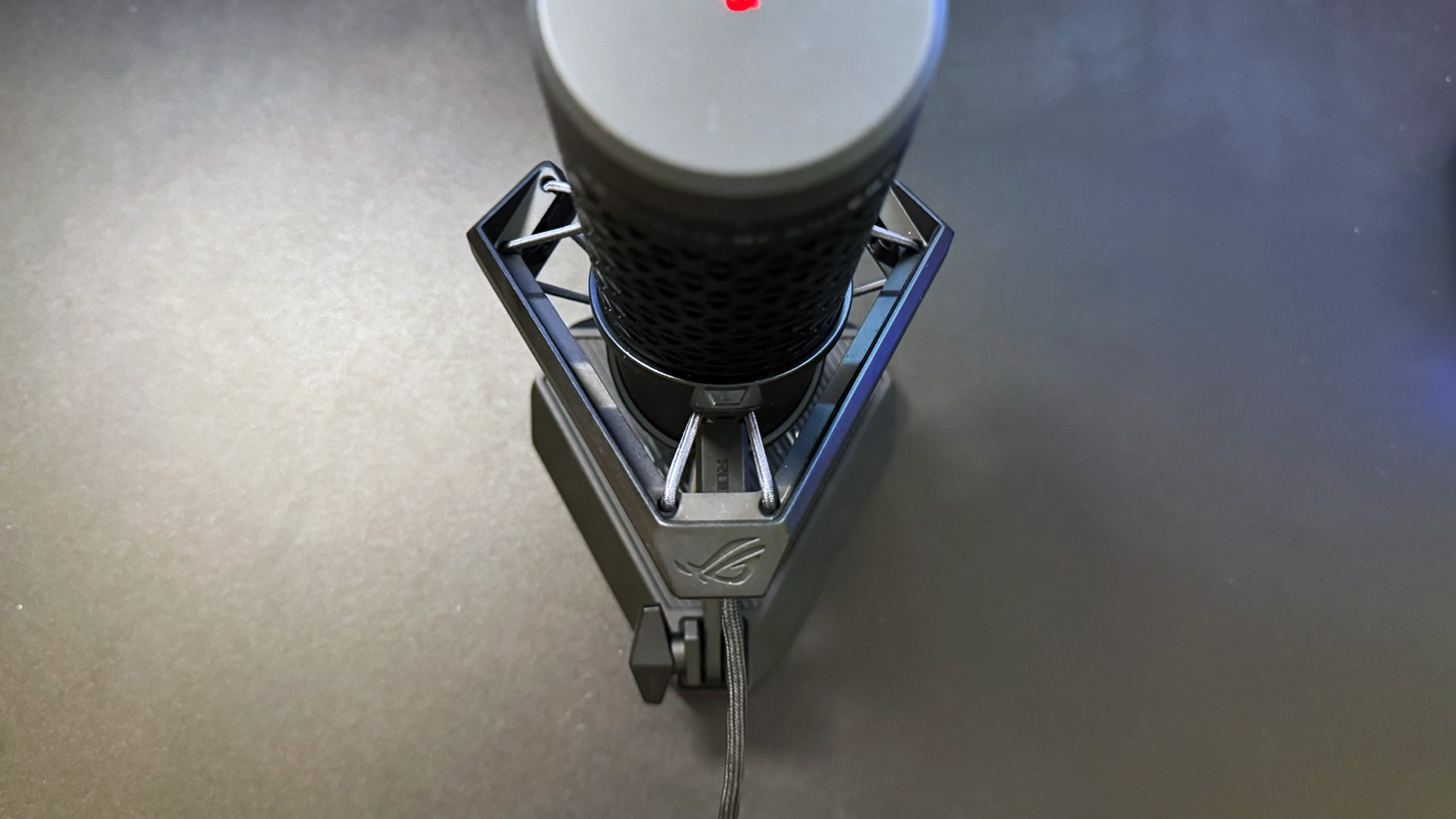
Moving further back to a more traditional streaming and gaming distance of around 30cm introduced some roominess and pulled back on the richness. It still sounded clear and I was happy overall but my voice began to sound a little more withdrawn and lost some of its podcast feel. This isn’t unusual for condenser microphones though, the final sound is just more natural like you’re sitting in the room with someone rather than watching a more produced broadcast. The benefit however is the freedom of movement available around the front of the microphone. Even when I pushed this well outside the limit of how far someone would likely move while gaming the ROG Carnyx continued to pick up my voice clearly with little to no drop-off in overall quality.
The 3.5mm headphone jack works exactly as you’d expect it to, no complaints there but make sure you run a few tests with the onboard high pass filter before going live. It certainly works, though perhaps a little too aggressively as in my quiet and slightly treated setup, I found it had a detrimental effect on my overall sound rather than helping improve it. I have little need for a high pass filter though so this wasn’t necessarily surprising. At the same time, I wouldn't recommend just leaving it on and blindly assuming it will make things better since my voice was more rounded and filled out with it off.
Should you buy the Asus ROG Carnyx?
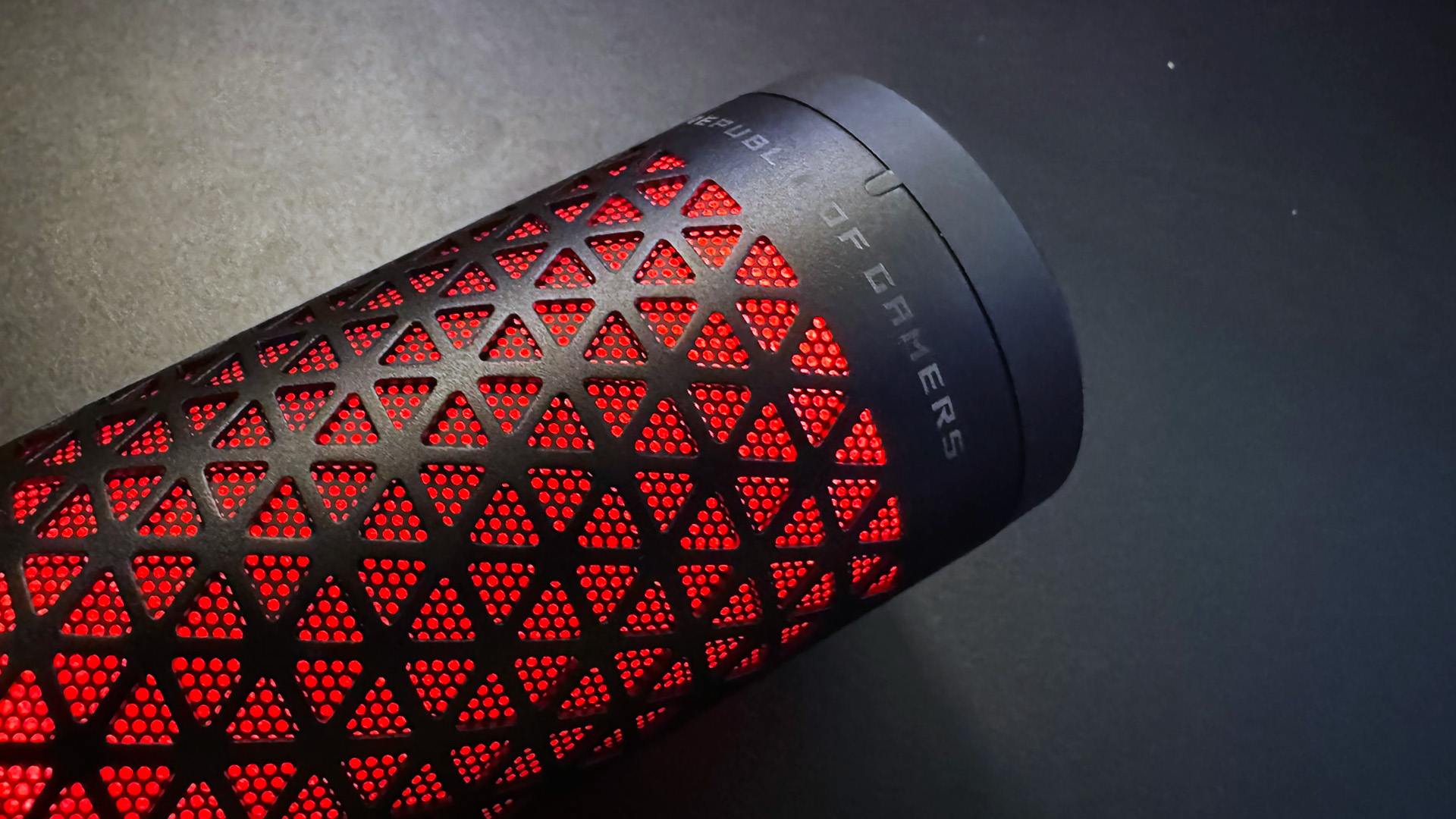
The streaming microphone space is a crowded one so joining its upper echelon is always going to be a tough ask. The ROG Carnyx certainly holds its own and arrives as a very good option that's priced somewhat reasonably. Unfortunately, it doesn't necessarily stand out from others at this price range as a result. The large diaphragm does deliver the strong, clean sound ROG promises and by paying a little extra attention to mic etiquette it's capable of producing great vocals.
Frustratingly, it’s much too large for a home-targeted microphone and it makes it awkward trying to fit it into a standard gaming setup. For gamers not blessed by mountains of space at one of the best gaming desks, this is almost a non-starter as a result, no matter how good it can sound at times. If you’re flushed with desktop real estate then the Carnyx is definitely worth a look, but there are equally strong options from brands like Elgato and SteelSeries in far smaller packages.
How we tested the Asus ROG Carnyx
I added the ROG Carnyx to my desktop PC setup and used it for dedicated testing, streaming, and general calls for a couple of weeks. It was mounted both on the included stand and an Elgato Wave Arm mic arm but was used without the accompanying software as this was not recognized.
For more on how we test the latest mics for review purposes, take a look at our hardware policy.
For more on the latest streaming hardware, check out the best ring lights for streamers, the best green screen, and the best Razer streaming gear.







